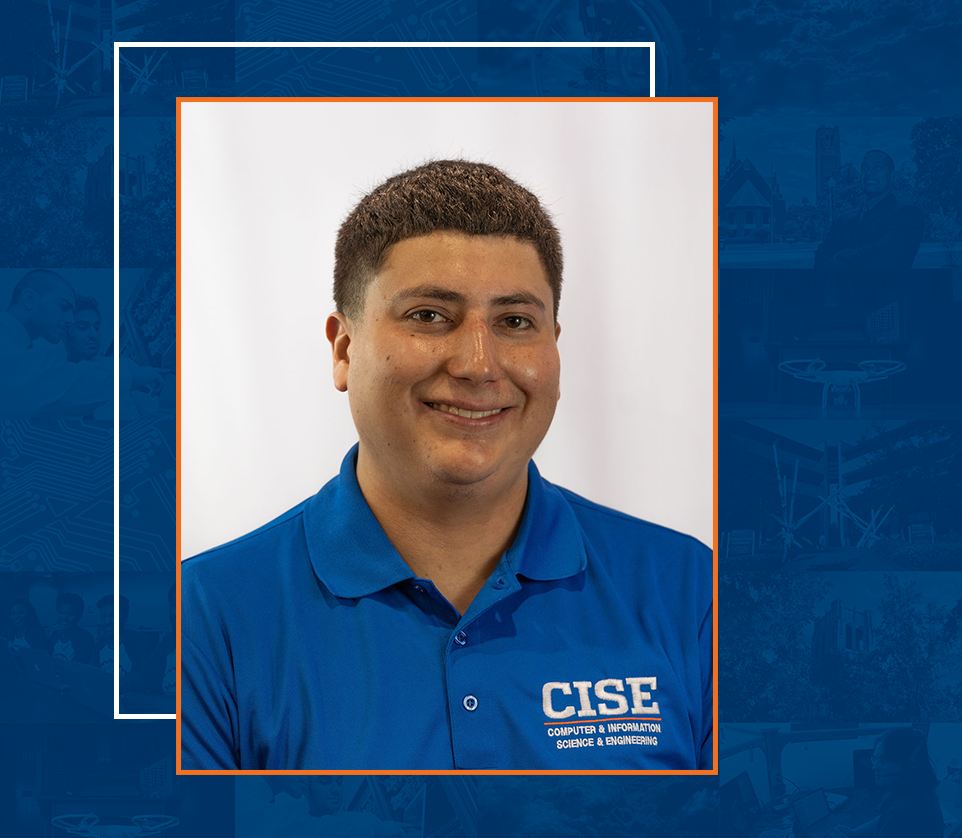 Brendan David-John, a Ph.D. student in the Department of Computer & Information Science & Engineering (CISE), was recently named a Google Ph.D. Fellowship recipient under the area of Human-Computer Interaction. According to the list of recipients from the fellowship’s inception, David-John is the first student from any Florida university to receive the fellowship.
Brendan David-John, a Ph.D. student in the Department of Computer & Information Science & Engineering (CISE), was recently named a Google Ph.D. Fellowship recipient under the area of Human-Computer Interaction. According to the list of recipients from the fellowship’s inception, David-John is the first student from any Florida university to receive the fellowship.
David-John’s research area is at the intersection of applied perception and computer graphics, using eye tracking to record and understand human behavior with a focus on augmented and virtual reality (AR/VR). More recently, his focus has been related to eye tracking in the context of privacy and security and working to establish methods to protect users from privacy risks prior to eye tracking becoming a mainstream technology. He is part of the Jain Lab and is advised by Eakta Jain, Ph.D., a CISE assistant professor.
“Receiving this fellowship allows me the freedom to focus most of my time on innovative research in a newly emerging field. Our lab is at the forefront of research in privacy and security in eye tracking, and this fellowship enables our work without the need to seek funding from external or internal grants,” David-John said. “Additionally, the fellowship provides me direct mentorship from industry experts at Google that will enable me to grow as a researcher and accomplish ground-breaking work within the eye-tracking and AR/VR communities.”
David-John is from Salamanca, N.Y., which is located on the Allegany Reservation of the Seneca Nation of Indians. He hopes to increase the representation of Native Americans in STEM and higher education, specifically in computing. He is a member of the American Indian Science & Engineering Society (AISES) and has been a Sequoyah Fellow since 2013. He said AISES played a pivotal role in his path to eye-tracking research, beginning with early recruitment from his high school by the Rochester Institute of Technology and student members of their AISES chapter. Later, a faculty mentor in AISES suggested he apply for a National Science Foundation-sponsored REU program, which introduced him to eye-tracking research and built connections getting him to where he is today.
“Without finding that opportunity, I may not have seen the side of Computer Science (CS) that is used to further our understanding of human perception and create technology to learn from and help people,” he said. “I may not have even pursued graduate school without seeing how exciting and rewarding CS research is. Based on this experience, it has become a goal of mine to discover and mentor indigenous students in computing who may be in a similar situation; and further increase indigenous representation in STEM and CS fields.”
Before coming to UF, David-John received his bachelor’s degree in computational mathematics and his master’s degree in computer science from the Rochester Institute of Technology. He was an NSF Graduate Research Fellow from 2017 to 2020, and he is currently a virtual intern at Facebook Reality Labs.
“Brendan is an asset to our team, and this fellowship is well-deserved,” Dr. Jain said. “His thesis focuses on what security and privacy vulnerabilities are created for the public when they are being eye tracked 24/7. We are one of the first groups looking at these issues and working toward solutions.”
Google Ph.D. Fellowships directly support graduate students as they pursue their Ph.D., as well as connect them to a Google Research Mentor. The Google Ph.D. Fellowship Program was created to recognize outstanding graduate students doing exceptional and innovative research in areas relevant to computer science and related fields. Fellowships support promising Ph.D. candidates of all backgrounds who seek to influence the future of technology.
For more information, visit the Google Ph.D. Fellowship website.
